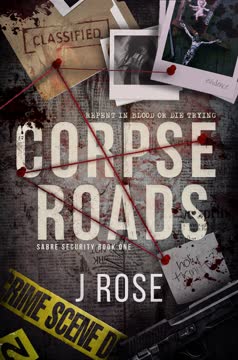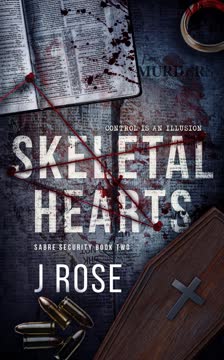Plot Summary
Blood and Scripture
The story opens with Michael Abaddon, a man tormented by religious mania and violence, performing self-flagellation and praying for forgiveness after another brutal act. His relationship with his wife, Rosetta, is one of dominance and abuse, justified by his warped sense of divine mission. Michael's past is haunted by a childhood in Genesis Home, a place of trauma and recovery, and he is now on the run, changing identities to evade justice. His encounter with his half-sister Giana reveals a family legacy of abandonment and pain, and Michael's obsession with purity and punishment is clear. He is determined to "save" his family, even if it means stealing a child to replace what he believes God has denied him.
Sanctuary in Exile
Harlow, the protagonist, is living in hiding with her chosen family—Leighton, Enzo, Theo, and Hunter—on a secluded Costa Rican beach. The group is healing from past traumas, finding solace in each other's company, and learning to communicate, especially as Hunter copes with his new deafness. Their days are filled with study, therapy, and playful banter, but the shadow of Michael's threat lingers. Harlow's journey is one of recovery, learning to trust, and reclaiming agency over her body and mind. The group's dynamic is intimate and complex, with each member supporting and challenging the others as they try to build a new life far from the violence that once defined them.
Fractured Family Bonds
The peace is shattered when the outside world intrudes—reporters discover their location, forcing the group to flee back to England. The return is fraught with anxiety, as they must confront unfinished business: legal cases, family estrangements, and the ever-present threat of Michael. Harlow's relationship with her father, Oliver, is tentatively rebuilt, while her mother, Giana, remains a source of pain and betrayal. The group's homecoming is marked by efforts to create a true sanctuary, but the scars of the past are never far from the surface.
Healing and Homecoming
Back in England, the group focuses on making their house a home, supporting each other through therapy, and facing the realities of Hunter's disability. Brooklyn, a close friend, faces her own crisis with an unexpected pregnancy, highlighting the theme of found family and polyamory and the complexities of healing. Harlow's writing becomes a lifeline, a way to process trauma and consider sharing her story with the world. The group's bonds are tested and strengthened as they navigate personal growth, forgiveness, and the challenges of reintegration.
The World Watches
A mass suicide orchestrated by Michael's cult shocks the nation, thrusting Harlow and her family into the media spotlight. The press conference that follows is a crucible for Harlow, forcing her to confront public vs. private identity, survivor's guilt, and the need to speak her truth. The world's gaze is both a threat and an opportunity, as Harlow realizes the power of her voice and the importance of reclaiming her narrative. The group must balance the demands of public life with the need for privacy and safety.
Cults and Copycats
Michael's influence grows, inspiring copycat killings and a wave of hysteria. The Angels of the Abyss, his cult, become a national threat, orchestrating attacks and manipulating vulnerable followers. The investigation intensifies, with the group and their allies racing to identify connections, prevent further violence, and bring Michael to justice. The psychological toll is immense, as the boundaries between victim and survivor blur, and the cost of confronting evil becomes ever more personal.
The Press and the Past
Harlow's decision to write a memoir becomes a focal point, symbolizing her struggle to own her story and offer hope to others. The group faces legal and moral dilemmas as they prepare for Giana's trial and the possibility of testifying against her. The past refuses to stay buried, as new revelations about Michael's family and the extent of his crimes come to light. The need for closure and the desire for justice drive the narrative forward, even as the risks escalate.
Brooklyn's Crisis
Brooklyn's mental health crisis and pregnancy bring the theme of generational trauma to the fore. Her struggle with schizophrenia, fear of motherhood, and the support of her partners and friends highlight the importance of community and unconditional love. Harlow's role as confidante and advocate underscores her growth from victim to survivor, capable of supporting others even as she continues to heal herself.
Ghosts and Graves
Visits to graves—Alyssa's, Brooklyn's brother's—become moments of reflection and catharsis. The group confronts their collective grief, guilt, and the ways in which the dead continue to shape the living. These scenes are marked by vulnerability, forgiveness, and the slow, painful process of letting go. The past is ever-present, but the characters begin to find meaning and hope in their survival.
Boundaries and Beginnings
The narrative explores the complexities of intimacy, consent, and desire as Harlow and her partners navigate their relationships. Scenes of sexual exploration are interwoven with moments of emotional honesty, highlighting the ways in which trauma and recovery intersect. The group's commitment to each other is tested and reaffirmed, and Harlow's journey toward self-acceptance is mirrored in her willingness to embrace pleasure and vulnerability.
The Guilt That Remains
Harlow's guilt over surviving when others did not is a recurring theme, culminating in her confrontation with Michael and the realization that she is not responsible for his crimes. Therapy, writing, and the support of her family help her to reframe her narrative, moving from self-blame to self-forgiveness. The process is neither linear nor easy, but it is essential to her ability to move forward.
The Angels of the Abyss
The investigation leads to the discovery of Michael's sister, Daphne, and the true extent of the cult's operations. A final, violent confrontation in a burning forest tests the group's resolve and unity. Harlow's bravery in saving her half-brother Ulrich from a ritual sacrifice is a turning point, symbolizing her transformation from victim to hero. The aftermath is marked by loss, injury, and the bittersweet satisfaction of survival.
The Hunt for Daphne
Daphne's role as the true architect of the cult's violence is revealed, forcing Harlow to confront the full horror of her family's legacy. The interrogation scenes are tense and psychologically charged, as Harlow faces the woman who orchestrated her suffering. The victory is hollow, as the cost of justice is measured in lives lost and innocence destroyed.
The Trap Springs
Ulrich's kidnapping by the cult is the ultimate test, forcing the group to make impossible choices and confront the limits of their power. Michael's manipulation reaches its zenith, as he demands his own release in exchange for the boy's life. The group's unity and resourcefulness are pushed to the brink as they navigate a deadly trap.
Fire and Sacrifice
The climactic confrontation takes place in a burning forest, where Harlow risks everything to save Ulrich from being burned alive. The battle is chaotic and brutal, with the cult's followers fighting to the death. Harlow's courage and determination are matched by the loyalty and love of her family, who fight alongside her. The victory is hard-won, and the scars—physical and emotional—are lasting.
The Price of Survival
In the aftermath, the group tends to their wounds and begins the slow process of rebuilding. Harlow's injuries are severe, but her spirit is unbroken. The legal and emotional consequences of the battle are explored, as the group faces the reality of leaving Sabre Security behind and forging new paths. The theme of survival is reframed as an ongoing process, not a single event.
Justice and Forgiveness
Michael and Daphne are brought to justice, and Harlow attends her mother's funeral, finding a measure of peace and forgiveness. The group's decision to leave Sabre and start anew is a testament to their growth and resilience. Harlow's memoir is published to acclaim, offering hope to others and cementing her legacy as a survivor and advocate.
A New Name, A New Life
The story concludes with Harlow embracing her new identity, surrounded by her chosen family. The group's move to Australia symbolizes a fresh start, free from the shadows of the past. Harlow's Pulitzer Prize for her memoir is a crowning achievement, but the true victory is in the love, healing, and hope that define her new life. The final scenes are a celebration of survival, resilience, and the power of found family.
Characters
Harlow Kensington (Leticia Kensington)
Harlow is the central figure, a woman forged in the crucible of captivity and abuse. Her journey is one of reclaiming agency, healing from trauma, and learning to trust and love again. Psychoanalytically, Harlow embodies the struggle between victimhood and empowerment, haunted by guilt but driven by a fierce will to survive. Her relationships—with her partners, her estranged parents, and her half-brother—are complex and deeply human. Harlow's development is marked by vulnerability, resilience, and a growing sense of purpose, culminating in her decision to share her story with the world.
Michael Abaddon (Pastor Michaels)
Michael is a study in religious fanaticism and psychopathy, driven by a belief in his own divine mission. His abuse of power, manipulation of followers, and obsession with purity make him a terrifying villain. His relationship with Harlow is one of domination and projection, as he seeks to break her spirit and remake her in his image. Michael's ultimate defeat is both a personal and symbolic victory for Harlow and all his victims.
Enzo Montpellier
Enzo is the group's rock—physically imposing, fiercely loyal, and deeply protective. His relationship with Harlow is marked by tenderness and possessiveness, but also a willingness to let her grow and lead. Enzo's own trauma and survivor's guilt inform his actions, and his journey is one of learning to let go of control and embrace vulnerability. He is the architect of the group's safety and the first to advocate for leaving Sabre behind.
Leighton Rodriguez
Leighton brings levity and warmth to the group, masking his own pain with humor and charm. His relationship with Harlow is playful and passionate, and he is often the first to support her decisions. Leighton's struggle with self-worth and his desire to build a life beyond his past mistakes are central to his arc. He is the glue that holds the group together in moments of crisis.
Theo Young
Theo is the group's mind—a brilliant hacker with a quiet, introspective nature. His journey is one of searching for identity and family, having grown up in foster care with no knowledge of his origins. His relationship with Harlow is slow-burning and deeply intimate, marked by mutual respect and a shared love of books. Theo's discovery of his biological family and his role in the group's survival are key to his development.
Hunter Rodriguez
Hunter is Leighton's older brother, a former leader now grappling with the loss of his hearing and sense of purpose. His relationship with Harlow is protective and intense, and his struggle to adapt to disability is a major theme. Hunter's arc is one of learning to accept help, redefine masculinity, and find hope in new beginnings. His eventual surgery and recovery symbolize the possibility of healing even after profound loss.
Brooklyn West
Brooklyn is Harlow's closest friend, a woman battling schizophrenia and the legacy of her own trauma. Her polyamorous relationship with five men and her unexpected pregnancy highlight themes of chosen family and resilience. Brooklyn's crisis and recovery are a mirror to Harlow's journey, and her presence is a source of strength and solidarity.
Giana Kensington
Giana is Harlow's estranged mother, a woman broken by her own trauma and complicit in Michael's crimes. Her relationship with Harlow is fraught with guilt, longing, and the impossibility of true reconciliation. Giana's death is a turning point, forcing Harlow to confront the limits of forgiveness and the necessity of letting go.
Daphne Portcastle
Daphne is Michael's sister and the true architect of the cult's violence. Her manipulation, intelligence, and lack of remorse make her a chilling antagonist. Daphne's role in Harlow's suffering is revealed late in the story, forcing a final reckoning with the past and the nature of evil.
Ulrich
Ulrich is Harlow's young half-brother, a child caught in the crossfire of generational trauma. His abduction and rescue are central to the climax, and his survival represents the possibility of breaking the cycle of violence. Ulrich's relationship with Harlow is one of tentative trust and mutual healing.
Plot Devices
Trauma and Recovery
The narrative is structured around the long-term effects of trauma—physical, psychological, and generational. Flashbacks, therapy sessions, and journal entries provide insight into the characters' inner worlds. The story uses the motif of scars—visible and invisible—to explore the process of recovery, emphasizing that healing is nonlinear and often communal.
Found Family and Polyamory
The group's polyamorous dynamic is both a source of strength and a challenge, requiring constant negotiation of boundaries, consent, and trust. The theme of chosen family is central, offering an alternative to the blood ties that have brought so much pain. The narrative structure alternates perspectives, deepening the reader's understanding of each character's motivations and growth.
Cults, Manipulation, and Mass Hysteria
Michael's cult, the Angels of the Abyss, is a vehicle for exploring the psychology of fanaticism and the dangers of charismatic leadership. The story uses foreshadowing and parallelism—between past and present, victim and perpetrator—to heighten tension and underscore the stakes. The escalation from isolated violence to mass hysteria mirrors real-world phenomena, grounding the narrative in contemporary anxieties.
Public vs. Private Identity
Harlow's journey from silence to public testimony is mirrored in her decision to write a memoir. The tension between the need for privacy and the demands of public scrutiny is a recurring plot device, with the media serving as both antagonist and catalyst for change. The use of press conferences, viral videos, and social media reflects the modern landscape of trauma and justice.
Redemption and Forgiveness
The story is structured around cycles of guilt, confession, and forgiveness—both self-directed and toward others. The legal and moral dilemmas faced by the characters force them to confront the meaning of justice, the possibility of redemption, and the necessity of letting go. The final chapters use the motif of new names and new beginnings to symbolize transformation.
Analysis
Hollow Veins is a harrowing, unflinching exploration of trauma, survival, and the power of found family. J. Rose crafts a narrative that is both deeply personal and broadly resonant, using the conventions of dark romance and thriller to interrogate the nature of evil, the legacy of abuse, and the possibility of healing. The story's polyamorous structure challenges traditional notions of love and loyalty, offering a vision of community as salvation. The depiction of cult dynamics and mass hysteria is chillingly relevant, reflecting contemporary anxieties about manipulation, fanaticism, and the fragility of truth. At its core, the novel is a testament to resilience—the capacity to endure, to forgive, and to build a new life from the ashes of the old. Harlow's journey from victim to survivor to advocate is both inspiring and realistic, acknowledging the messiness of recovery and the ongoing work of self-acceptance. The book's ultimate message is one of hope: that even in the darkest of times, love, courage, and the willingness to speak one's truth can light the way forward.
Last updated:
Review Summary
Hollow Veins receives mostly positive reviews, with readers praising the character development, emotional depth, and satisfying conclusion to the Sabre Security series. Many appreciate the growth of Harlow and her relationships with the four male characters. The dark themes and intense plot are highlighted as strengths. Some criticisms include pacing issues and underdeveloped connections between characters. Overall, fans of dark romance and reverse harem genres find it a compelling read, with many noting it as a fitting end to the trilogy.
Sabre Security Series
Similar Books
Download PDF
Download EPUB
.epub digital book format is ideal for reading ebooks on phones, tablets, and e-readers.











